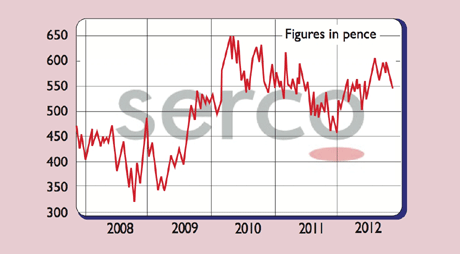
Serco has done extremely well out of it, but outsourcing could have run its course for now, says Phil Oakley.
The business
Serco’s main business is to provide essential services that were previously offered by governments and companies. As a result it has its fingers in many pies. Most of us will have been on the receiving end of one of its services without even realising it. It makes money by doing jobs better and cheaper than if they were provided in-house.
In Britain, Serco runs train companies such as the Docklands Light Railway (part of London’s tube network), air traffic control systems, and operates speed and traffic cameras. It also runs five prisons as well as providing border control and immigration services.
Serco also provides lots of services in the education, welfare and defence sectors. A mainstay of its services is sorting out the efficiency of business processes in private companies and local authorities.
The company has also built up sizeable businesses in the Americas, Australia and Asia. In 2011 it had sales of £4.6bn. Ninety per cent of its revenues come from central and local governments.
The history
The company can trace its roots back to 1929 when Radio Corporation of America (RCA) formed a British company to support the growing cinema industry – RCA Services Limited. It wasn’t until the early 1960s that it began doing the sort of work that Serco does today.
The change came about when it was awarded a maintenance contract for Britain’s Ballistic Missile Early Warning System. The contract was so successful that it became the blueprint for Ministry of Defence (MOD) outsourcing contracts.
RCA continued to win contracts with the MOD and by the early 1980s had branched out into other areas, when it was awarded the role of maintaining London’s traffic lights. In 1987, the company was bought by its management team and renamed Serco. It listed on the London Stock Exchange the following year.
Since then, Serco has benefited from a boom in outsourcing, particularly from governments. The British government has become a big customer as it has sought to get better value for money in public services. In recent years, the firm has also bought other businesses in order to expand into new parts of the world and different service markets.
During the last five years, Serco’s profits have more than doubled, yet the performance of its shares has been fairly lacklustre, as investors have questioned its ability to keep on growing in the face of threatened public-sector cutbacks and austerity measures.
The chief executive
Christopher Hyman has held the top job at Serco since 2002. He started out as an accountant in South Africa before moving to Britain in the early 1990s to work for Ernst & Young. He moved to Serco in 1994 and became finance director of the group’s European business. A decent sprinter in his youth, he is rumoured to be fiercely competitive and has raced Formula 3 motor cars in his spare time.
And unlike many chief executives, who are mainly focused on squeezing out extra profits, Hyman puts the customer above everything else. He reckons that if the company does a good job for its clients, profits will look after themselves. He took home £1.9m in 2011.
Should you buy the shares?
There are quite a few things to like about Serco. It has a very secure income stream from all its outsourcing contracts, which gives investors a degree of security – at least in the short term. It is still winning new business and now has an order book of close to £20bn. Profit margins are expected to rise too. It also has a good track record of turning its profits into cash, which is always a welcome sign.
But can it keep growing? Governments on both sides of the Atlantic are already spending and borrowing too much money. This will have to be reined in sooner or later. The bull case – and an argument that companies like Serco like to make – is that they are part of the solution to this problem of overspending. They say that their expertise can help governments become more efficient – they can spend less and yet do a better job.
This may be true, but the sheer scale of spending cuts that will be needed to put the government finances on an even keel suggests that there could be less work for outsourcing companies in the future. Serco and similar companies in the sector may find it difficult to keep making the same amount of money when existing contracts are put out to tender again. Either the amount of work involved in the contract could be reduced, or the price offered for taking on the contract could be cut, or both. We may be seeing signs of cost-cutting already as sales in Britain and America were down during the first six months of the year.
But the main problem with Serco shares, and the most important issue from an investment point of view, is that they simply aren’t cheap enough to offer good value. They are trading at just over 13 times expected earnings, which does not reflect the risks of contracts being lost and the fact that there may be less work to go round in the future. The dividend yield is also too low to make the stock attractive to income-seekers. We see no reason to hold the shares.
VERDICT: AVOID
The numbers
Stockmarket code: SRP
Share price: 541p
Market cap: £2.7bn
Net assets (June 2012): £642m
Net debt (June 2012): £1,030m
P/e (current year estimate): 13.2 times
Yield (prospective): 1.7%
Interest cover: 5.3 times
What the analysts say
Buy: 9
Hold: 12
Sell: 4
Average price target: 615p
Directors’ shareholdings
C Hyman (CEO): 917,024
A Jenner (FD): 364,831
A Lyons (chairman): 15,000